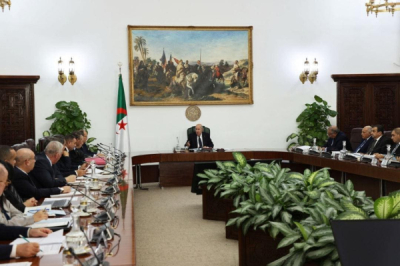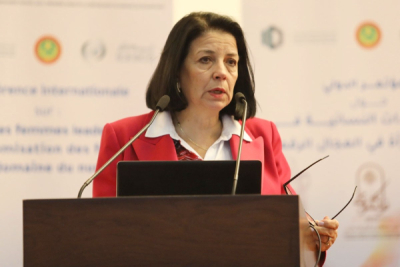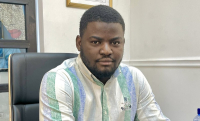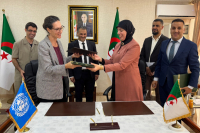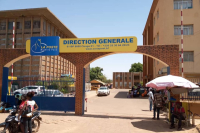The digital solution addresses one of the educational system's major challenges: guidance for high school students and recent graduates. The venture originated at the Congo-Cameroon Inter-State University, based in Sangmélima, Cameroon.
Laboussole is a Cameroonian platform that helps users make informed decisions about their studies, fields of specialization, or careers. The platform targets high school students, young people in retraining, and professionals seeking new career paths.
“Many students choose fields that don’t match their skills or market needs for lack of proper guidance, which only worsens unemployment,” said the founder. “Our goal is to help them make informed choices and fully realize their potential.”
Through the platform, users can explore job profiles, discover training opportunities at home or abroad, receive personalized advice and mentorship, and take targeted online courses, particularly in digital fields.
The tool seeks to address weaknesses in academic and career guidance systems in Africa, especially in Cameroon. By offering a digital alternative, Laboussole aims to bridge this gap and professionalize the career guidance process.
The platform has already attracted several thousand users. Mbeyo’o Nna said the goal is to reach 10,000 users by the end of 2025 and expand into Central Africa. The platform is currently available in Cameroon and the Republic of Congo.
For young Cameroonians, the platform offers a new guide in a complex academic and professional landscape. For the education sector, it marks an innovation that could strengthen the links between guidance, training, and employment.
Adoni Conrad Quenum
- Djibouti seeks digital consultant to modernize disaster risk and warning systems
- Mission runs Nov 2025-Feb 2026 under UNDP, CIDCA-backed TIAEWS project
- Focus on AI, Big Data, SOPs, and training to boost national resilience
The government of Djibouti, through the Executive Secretariat for Disaster Risk Management (SEGRC), in partnership with the United Nations Development Programme (UNDP) and with support from the China International Development Cooperation Agency (CIDCA), issued a call for applications on Sunday, November 2. It seeks an international consultant specializing in digital transformation for risk management and early warning systems.
The consultant will assist the SEGRC in assessing the country’s digital preparedness for disaster prevention and response. The mission, scheduled from November 2025 to February 2026, will include developing technical and strategic recommendations to improve digital governance and strengthen institutional capacity for national resilience.
Priority objectives include integrating advanced data processing and analysis technologies, including Big Data, artificial intelligence (AI), and platform interoperability, as well as optimizing national infrastructure and emergency operations centers. The consultant will also help draft Standard Operating Procedures (SOPs) and design training modules for operators and public officials.
The initiative is part of the “Tailored Intelligence for Actionable Early Warning Systems (TIAEWS)” project, which aims to strengthen national resilience to disasters. The project seeks to modernize Djibouti’s risk management system by incorporating advanced data collection and analysis tools, improving coordination among institutions, and providing more reliable and actionable early warnings to protect citizens and critical infrastructure.
The position is open to professionals with extensive experience in digital transformation for risk management. The selected candidate will deliver several key outputs, including an assessment of the country’s current digital landscape, a strategic roadmap for modernizing early warning systems, and policy recommendations.
Applications must be submitted by November 10 via the United Nations portal.
Samira Njoya
- Algeria approves draft law on digital trust, e-signatures, and ID services
- Law gives electronic documents full legal status, updates 2015 regulations
- Reform supports rising internet use, aims to boost digital economy and trust
The Algerian government approved a draft law on Sunday, November 2, that defines the general rules governing trust services for electronic transactions and digital identification. The initiative aims to support the growing digitalization of administrative, economic, and financial services while enhancing the security of online exchanges.
The text, reviewed by the Council of Ministers, establishes a comprehensive framework for digital trust. It updates the 2015 legislation on electronic signatures and certification, which officials deemed obsolete due to technological advancements. The new law grants legal value to electronic documents, including electronic signatures, seals, and timestamps, equivalent to their physical counterparts.
This reform comes amid rapid digital expansion. At the beginning of 2025, Algeria counted approximately 36.2 million internet users, representing a penetration rate of nearly 77%. The government states this dynamic necessitates a more robust legal environment to guarantee transaction reliability and personal data protection.
The project also introduces a national digital identification framework based on the existing biometric identity card. This system will centralize and secure citizen identities for online procedures, simplifying access to public services and ensuring legal recognition of digital transactions. It is considered a pillar of the national digitalization strategy, which aims to modernize the administration, enhance transparency, and combat corruption.
Beyond updating the legal framework, the law is expected to drive new momentum by reinforcing the confidence of citizens and businesses, simplifying administrative procedures, and stimulating investment in the digital economy. It should also enable Algeria to better leverage its significant digital potential, which includes over 55 million mobile connections, nearly 116% of the population, and rapidly growing digital equipment penetration.
Samira Njoya
- Gabon, Morocco to launch joint AI and digital skills training programs
- Talks focus on innovation, distance learning, and expanding digital cooperation
- Morocco ranks 4th in Africa on UN e-Government Index; Gabon seeks to improve
Gabon and Morocco are moving to expand cooperation in artificial intelligence, digital transformation and digital skills training following talks between their ministers in Rabat. Gabon’s Minister of Digital Economy, Digital Transformation and Innovation Mark-Alexandre Doumba met his Moroccan counterpart, Amal El Fallah Seghrouchni, on November 3 to outline future joint programs.
Doumba expressed Gabon’s interest in drawing on Morocco’s experience and forming a partnership centered on digital innovation and skills training. The two sides agreed to launch joint programs focused on AI and data analysis training, as well as on expanding distance learning through Moroccan digital platforms.
During the talks, El Fallah Seghrouchni highlighted Morocco’s national training initiatives such as “JobInTech,” along with programs designed to introduce children to digital technology and AI. She also invited Gabon to take part in the upcoming GITEX Africa exhibition in Morocco.
The partnership comes as Gabon works to make the digital sector a cornerstone of its economic development and reduce dependence on extractive industries. In 2025, Libreville expanded partnerships with countries including Turkey, Botswana, and Saudi Arabia to pursue this objective. Morocco, regarded as a continental leader in digital transformation, is seen as a key model.
The UNDP recently recognized Morocco’s leadership, highlighting its launch of the “Digital Morocco for Sustainable Development (D4SD Hub)” platform to promote inclusive digital transformation in Arab and African countries. Morocco ranks 90th globally and 4th in Africa on the 2024 UN e-Government Development Index (EGDI), with a score of 0.6841 out of 1, above both regional and global averages.
Gabon, for its part, ranks 121st globally with a score of 0.5741. It performs well in telecom infrastructure (0.8263) but lags in online services (0.3188) and human capital (0.5772).
Isaac K. Kassouwi
- Morocco drafts “Digital X.0” law to regulate AI, data, and identity
- Bill supports digital sovereignty, interoperability, and cybersecurity reforms
- Part of Maroc Digital 2030 strategy to boost AI and public service tech
Morocco is preparing to give its digital ecosystem a major legal overhaul with a new framework law known as “Digital X.0,” now under review by the General Secretariat of the Government. The draft, presented by Amal El Fallah Seghrouchni, Minister Delegate for Digital Transition and Administrative Reform, aims to integrate artificial intelligence (AI) into public and private operations while establishing strict governance for data and algorithms.
At the core of the bill are three priorities: data governance, digital identity, and interoperability. “Digital X.0” sets out principles for the flow and protection of data in line with Morocco’s existing personal data law (Law 09-08). It introduces a sector-specific digital identity that limits data access to what is strictly necessary for each area of activity and an interoperability model based on traceable consent, ensuring that any exchange of information between public agencies or private actors is explicitly authorized by users. Cybersecurity is a key element of the framework, designed to build digital trust without adding excessive layers of control.
The reform is part of Morocco’s national digital strategy, “Maroc Digital 2030,” which identifies artificial intelligence as a cornerstone of economic development and administrative modernization. The country has invested heavily in digital infrastructure, e-government services, and applied research in emerging technologies.
Recently, Morocco deepened this push through a strategic partnership with French startup Mistral AI to establish a lab focused on multilingual language models in Arabic, Amazigh, and African languages. The government has also launched a national program to train 200,000 young people in digital and AI skills to strengthen human capital and drive local innovation.
With “Digital X.0,” Morocco seeks to consolidate digital sovereignty, foster a competitive AI ecosystem, and promote responsible innovation. The law is expected to speed up the digital modernization of public administration and enhance the quality and efficiency of government services through advanced technologies.
Samira Njoya
By focusing on collaboration and technology, he offers an alternative path for supporting African entrepreneurs. His initiative is helping to structure new networks of opportunities across the continent.
Karim Sy, a Senegalese entrepreneur and business angel, is the founder and chief catalyst of Jokkolabs, an independent, non-profit organization that operates as a global open-innovation network and virtual cluster for social transformation.
Founded in 2010, Jokkolabs supports entrepreneurs by providing resources, mentorship, and a collaborative environment to help them grow. The organization runs a network of hubs across Africa and France, including locations in Dakar, Banjul, Ouagadougou, Bamako, Douala, Ziguinchor, Abidjan, and Nanterre.
Through its physical spaces and digital platform, Jokkolabs connects entrepreneurs, creators, and innovators. It offers coworking spaces, workshops, hackathons, and collaborative events, and also manages working groups. Its online learning platform, Jokkolabs Academy, provides digital training programs. The network targets startups, entrepreneurs, freelancers, and actors in the digital, creative, and innovation sectors.
Alongside his work at Jokkolabs, Sy serves as a special adviser to the Chamber of Commerce and Investment for Africa, Russia, and Eurasia (CCI Africa Russia & Eurasia). In 2020, he co-founded Black Elephant, a think tank and collaborative ecosystem launched during the COVID-19 lockdowns.
Sy holds a college diploma in pure and applied sciences from the Petit Séminaire de Québec in Canada (1990) and a degree in computer science from Polytechnique Montréal (1994).
In 2010, he joined the executive committee of the Economic Community of West African States (ECOWAS). Two years later, he became a board member of the Free and Open Source Software Foundation for Africa (FOSSFA), where he also serves as the liaison officer for Senegal.
Between 2010 and 2019, Sy held various roles at Maarch, a software publishing company, including board member, president, and general administrator. From 2018 to 2021, he sat on the board of Digital Africa, an initiative launched by French President Emmanuel Macron to support African entrepreneurship. Between 2021 and 2023, he also served on the board of Westlink Africa, a company specializing in the engineering, supply, and financing of large-scale telecommunications projects across the continent.
Melchior Koba
Through his technological vision, he is completely rethinking how businesses adopt digital solutions. His approach leverages innovation to drive performance and sustainable growth.
Jean-Paul Yetor, a Togolese software engineer and entrepreneur, is the founder and CEO of VR-AI, a company specializing in custom software development and digital transformation support for businesses.
Founded in 2024, VR-AI positions itself as a technology partner for companies of all sizes, offering web and mobile development, business software tools, digital strategy consulting, and application maintenance. Its services are grouped into three packages: “Lancement,” designed for startups and early-stage projects; “Croissance,” aimed at small and medium-sized enterprises seeking to strengthen their digital presence; and “Entreprise,” which targets large organizations with complex needs and includes tailored software development, strategic consulting, scalable architecture design, and dedicated technical support.
Alongside VR-AI, Yetor is involved in developing DressLike, an app that helps users build sustainable, personalized wardrobes. Before founding VR-AI, he co-founded EODS Communication in 2014, an agency focused on cultural and technological projects, and later Ndupé, a startup developing digital tools for the food industry.
In 2018, he co-founded Klumer, an event management platform designed to help organizers plan and promote their events, where he served as chief technology officer until August 2025.
Yetor holds a bachelor’s degree in mathematics and computer science from the University of Lomé.
Melchior Koba
In the Democratic Republic of Congo (DRC), Fondigne is positioning itself as a digital bridge connecting project developers, investors, and mentors. In 2025, the startup successfully participated in both Vivatech in France and the Osiane trade show in the Republic of the Congo.
Fondigne, a digital platform created by a Congolese startup of the same name, aims to bridge one of the weakest links in the Democratic Republic of Congo’s entrepreneurial ecosystem: access to capital and business guidance. Launched in March 2025 by founder Rama Djuma, the platform seeks to turn innovation into real investment opportunities.
Fondigne connects startups and entrepreneurs seeking funding with investors looking for high-potential ventures, while also offering mentorship from seasoned professionals and former entrepreneurs. Its “Devenir mentor (Become a Mentor)” section invites experienced profiles to support young businesses and contribute to national economic growth.
The platform operates as a marketplace, matching demand from entrepreneurs with supply from investors and mentors. This model helps address the country’s lack of structured networks that connect funding sources with emerging enterprises. In an environment where business incubators and venture capital channels remain limited, Fondigne could play a key role in formalizing fundraising processes, fostering trust, and encouraging investment in local ventures.
Its long-term success will depend on whether it can attract a critical mass of users, secure substantial investment flows, and deliver measurable returns for financiers.
Central Africa’s startup ecosystem remains the least funded on the continent. According to data from Partech Africa, startups in the Democratic Republic of Congo raised only $2 million in 2024 and $1 million in 2023, underscoring the steep challenge Fondigne aims to confront.
Adoni Conrad Quenum
- UNDP, Algeria sign deal to support digitalization of public services
- Two-year project targets training, policy reform, and tech ecosystem growth
- Initiative backs Algeria’s push for digital sovereignty and full connectivity
The United Nations Development Programme (UNDP) has pledged to support Algeria’s High Commission for Digitalization (HCN) in advancing the country’s digital transformation. The UN agency announced on October 28 that it had signed a two-year declaration of intent with the HCN for a technical assistance project aimed at modernizing public administration, strengthening the digital economy, and improving nationwide connectivity.
Under the agreement, the UNDP will provide technical and human expertise to design training programs, build local skills, and promote the adoption of international standards. The agency will also assist in shaping digital policies, implementing strategic innovations, and fostering inclusive partnerships among entrepreneurs, academics, policymakers, and the private sector to help build a resilient and sustainable digital ecosystem.
The initiative aligns with Algeria’s national digital transformation strategy, which prioritizes training, connectivity, and startup development. As of 2025, the country had more than 54 million mobile connections, equivalent to 116 percent of the population, and an internet penetration rate of 76.9 percent, according to DataReportal. Algeria aims to achieve universal digital coverage. The HCN’s efforts also respond to President Abdelmadjid Tebboune’s repeated calls to accelerate digitalization across all sectors and strengthen the country’s technological sovereignty.
If the cooperation leads to a full operational agreement, it could help modernize the public administration, improve interoperability of government data, and support startups while ensuring reliable and secure digital services for citizens and businesses. In the long run, the partnership could speed up the growth of an inclusive digital economy, expand access to online public services nationwide, and reinforce Algeria’s technological independence.
Samira Njoya
- Burkina Faso to transform post offices into digital service centers by 2030
- $9.7M plan targets rural access, with 20 “Zama Tchè” centers planned
- Move supports national strategy amid 83% offline population in 2023
Burkina Faso will equip post offices nationwide with digital assistance centers to help citizens access online public services. The plan aims to turn the national postal network into a driver of digital and financial inclusion.
The initiative was approved during the Cabinet meeting on Oct. 30, which endorsed a performance contract between the state and La Poste Burkina Faso. The plan calls for the gradual transformation of post offices into “citizens’ houses,” known as Zama Tchè. Under the 2026-2030 agreement, the state and La Poste will jointly fund the construction and outfitting of 20 such centers, at a total cost of 5.5 billion CFA francs (about $9.7 million).
The government said the move aligns with its broader effort to digitize administrative services and make them more accessible, transparent, and efficient. Expanding digital access to public services is one of Burkina Faso’s 12 national digital priorities under its 2030 strategy, which aims to ensure equal access to digital tools, including in rural areas.
Access to the services requires internet connectivity, digital devices, and basic skills, which remain out of reach for much of the population. In 2023, an estimated 83% of Burkinabe were not using the internet, according to the International Telecommunication Union. To bridge that gap, La Poste currently operates a network of 129 branches across the country, which will serve as the foundation for the new initiative.
Isaac K. Kassouwi
More...
- Q3 revenue rose to CFA875.7 billion ($1.6 billion), up 9.9% year-on-year
- EBITDAaL increased 7.8% to CFA305.3 billion
- Growth driven by mobile data, fiber, and expansion in Liberia and Burkina Faso
Orange Côte d’Ivoire Group reported revenue of CFA875.7 billion, about $1.6 billion, in the third quarter of 2025, marking a 9.9% increase compared with the same period in 2024, according to the company’s consolidated financial results released in October 2025.
“The company’s revenue performance is mainly supported by mobile data and fiber, driven by subscriber base expansion and increased digital usage,” the report stated.
The document also noted that Orange Liberia “continues its positive momentum, boosted by improved network quality and effective floor price implementation,” while Orange Burkina Faso’s growth was supported by sustained mobile service expansion, the rise of mobile money, and ongoing fiber network development.
Beyond revenue, other key indicators also improved. Earnings before interest, tax, depreciation, and amortization after lease costs (EBITDAaL) grew 7.8% to CFA305.3 billion in Q3 2025. Net profit reached CFA118.8 billion, compared with CFA118.6 billion a year earlier.
In an African context where small businesses are struggling to adapt to the digital economy, this Moroccan entrepreneur has designed a solution to simplify their daily management. His innovation aims to provide merchants with the necessary tools to remain competitive.
Moncef Chlouchi, a Moroccan engineer and entrepreneur, is the founder and CEO of Inyad, a startup helping small merchants and self-employed workers in the Maghreb and the Middle East embrace digital transformation.
Founded in 2018, Inyad offers a unified digital platform for professionals in retail, hospitality, and services, enabling users to manage sales, payments, and operations from a single interface. The platform targets “those who keep the economy running every day,” the company says.
Its tools include invoicing and quotation management, payment processing, payroll tracking, and inventory control. Restaurant owners can use the system to handle orders, payments, and staff schedules, while retailers can digitize daily operations such as timekeeping and real-time stock monitoring.
Inyad also provides a digital credit ledger that allows small businesses to record customer debts, track repayments, and simplify collection. The company has developed a mobile point-of-sale terminal designed for flexible use. To date, Inyad has raised $14 million in funding.
Chlouchi holds a master’s degree in applied mathematics from École Polytechnique in France (2012) and a master’s in mining engineering from Mines Paris -PSL (2013). He began his career in 2013 as a supply and commercial strategy analyst at Total Oil Asia Pacific Marketing & Services in Singapore before joining McKinsey & Company as a project manager from 2014 to 2017.
Melchior Koba
Combining technological expertise with a strategic vision, he is exploring new ways to use artificial intelligence to address the real needs of businesses.
Omar Maher, an Egyptian artificial intelligence expert, entrepreneur, and technology executive, is the co-founder and CEO of Monta AI, a company focused on developing advanced enterprise AI solutions.
Founded in 2024, Monta AI builds tools designed to enhance business performance using large language models (LLMs) and retrieval-augmented generation (RAG) systems to drive measurable growth for its clients.
The startup’s flagship product is an AI assistant capable of processing sensitive enterprise data in multilingual environments, including Arabic, while complying with strict local regulations. Monta AI also develops voice-based systems for digital assistants and contact centers, designed to understand complex contexts and interactions.
Another core offering is its Custom Agentic Solutions, intelligent agents that can reason, plan, and act autonomously to achieve defined business goals. These agents integrate with internal corporate systems to automate complex workflows and deliver quantifiable outcomes. The company also provides AI consulting services, guiding organizations from assessment and strategy through deployment and optimization.
Before launching Monta AI, Maher co-founded Trustious in 2012, a platform that helped consumers make purchasing decisions by aggregating reliable product reviews. In 2014, he founded Homna.com, an Egyptian online furniture marketplace.
Maher holds a bachelor’s degree in business informatics from the German University in Cairo (2009). He joined ITWORX in 2015, where he served as product director and later as head of global market development for advanced analytics and big data.
From 2016 to 2022, Maher worked at Esri, a global leader in geographic information systems, where he held successive roles including business development manager, head of AI and machine learning practice, and director of AI. Between 2022 and 2023, he served as director of product marketing at Parallel Domain, a company specializing in synthetic data generation for AI systems.
Melchior Koba
In June 2025, the startup raised $4 million to accelerate the development of its infrastructure and prepare for its international expansion.
Caantin, a Zambian fintech launched in 2025 by entrepreneur Njavwa Mutambo, is using artificial intelligence to automate debt collection through voice, SMS, and WhatsApp agents. The platform handles the entire recovery process, improving repayment rates by 18 to 22 percent while reducing collection costs by up to 60 percent, according to the company.
“Think of it as replacing human collection agents with AI that works 24/7, improves recovery rates, and reduces costs,” Mutambo told Disrupt Africa. “Traditional dialers are manual and expensive. Human agents are inconsistent and don’t scale.”
The system is built on an AI infrastructure capable of managing more than one million calls per day, effectively replacing conventional call centers staffed by human agents. The bots can communicate in multiple African languages, send reminders, propose payment plans, and integrate directly with payment systems.
By automating the process, Caantin aims not only to optimize debt recovery but also to improve the debtor experience through more personalized and respectful communication.
“We are expanding to the UK and South Africa in Q1 of next year, and also exploring strategic partnerships with larger fintechs,” Mutambo said.
As financial services across Africa become increasingly digital, Caantin’s model highlights how AI-driven automation could transform how lenders and financial institutions manage debt recovery on the continent.
Adoni Conrad Quenum




